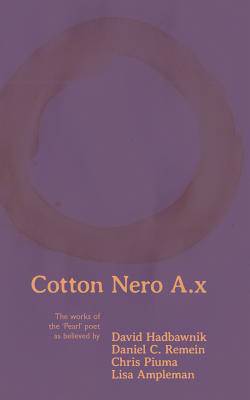
- Retrait gratuit dans votre magasin Club
- 7.000.000 titres dans notre catalogue
- Payer en toute sécurité
- Toujours un magasin près de chez vous
- Retrait gratuit dans votre magasin Club
- 7.000.0000 titres dans notre catalogue
- Payer en toute sécurité
- Toujours un magasin près de chez vous
31,45 €
+ 62 points
Description
Manuscript Cotton Nero A.x takes its designation from the unique cataloging system of seventeenth-century British antiquarian Sir Robert Cotton's library: busts of historical figures atop shelves provided the organizing principle, such that one found this particular codex under the bust of Roman Emperor Nero, on the top shelf, ten volumes over. (Another famous manuscript, containing Beowulf, is called Cotton Vitellius A.xv.) Cotton Nero A.x contains the only versions of the poems we now know as Pearl, Cleanness, Patience, and Sir Gawain and the Green Knight, generally agreed to have been composed sometime in the latter half of the fourteenth century-the time of Piers Plowman and Geoffrey Chaucer, though radically different from either. No one knows who the poet was. No one knows if more than one poet wrote some or all of the poems. Together, they present a stunning array of themes, allegories, and images that critics continue to puzzle over: Patience offers a psychologically complex rendering of the Old Testament story of Jonah and the whale; Cleanness explores its homiletic theme in carnal and spiritual terms with complexity, irony, and even humor; Pearl provides a dream allegory that pushes at the distinction between its earthly and heavenly meanings, challenging the very notion of metaphysical transcendence its form seems to point towards. Finally, Sir Gawain and the Green Knight, the most secular of the poems, is a sophisticated take on Arthurian legend that unfolds like a psychosexual mystery novel, with no easy solution in sight. All the poems are rendered in a difficult Middle English dialect and intricate alliterative form, which sometimes involves a complex rhyme scheme as well. As poet-medievalists, we bow before the poetic achievement of the works in Cotton Nero A.x in all their multi-faceted richness. This is not a translation, nor an interpretation. It is what might be called a trace. A response. A homework assignment from beyond the grave, for four students who should have known better. A dream we hope to dream.
Spécifications
Parties prenantes
- Auteur(s) :
- Editeur:
Contenu
- Nombre de pages :
- 54
- Langue:
- Anglais
Caractéristiques
- EAN:
- 9780615983912
- Date de parution :
- 24-04-14
- Format:
- Livre broché
- Format numérique:
- Trade paperback (VS)
- Dimensions :
- 127 mm x 203 mm
- Poids :
- 63 g

Les avis
Nous publions uniquement les avis qui respectent les conditions requises. Consultez nos conditions pour les avis.






